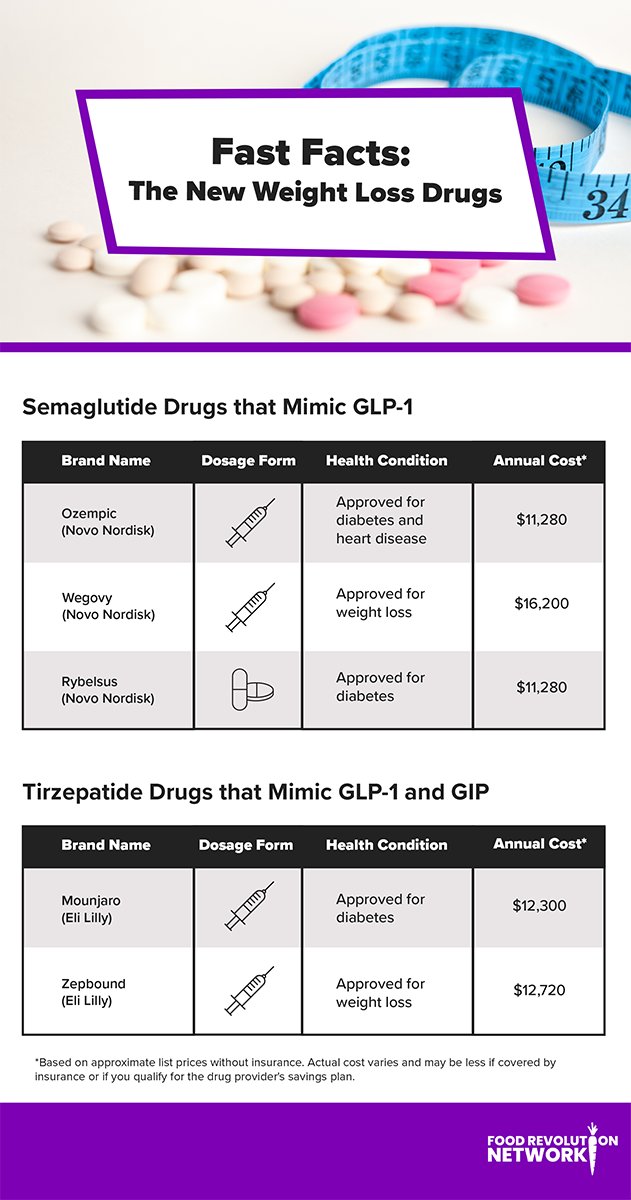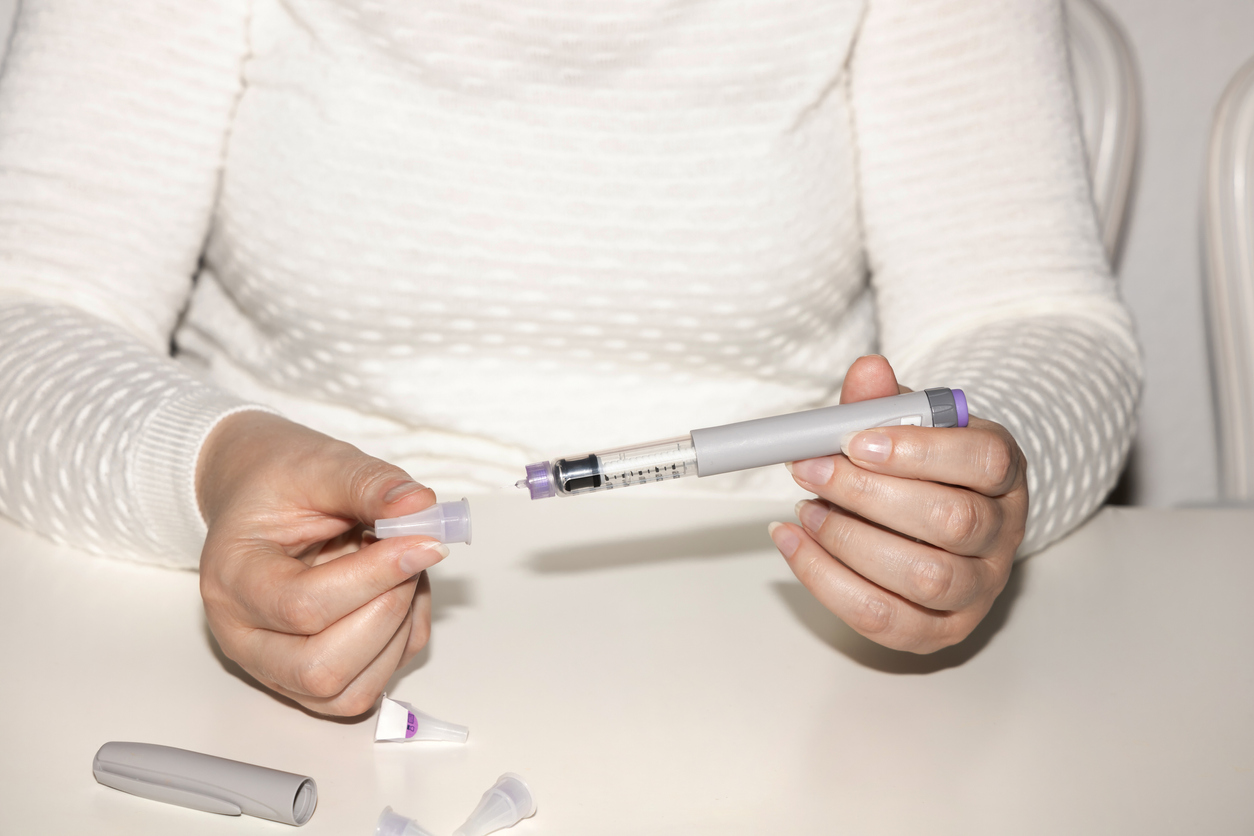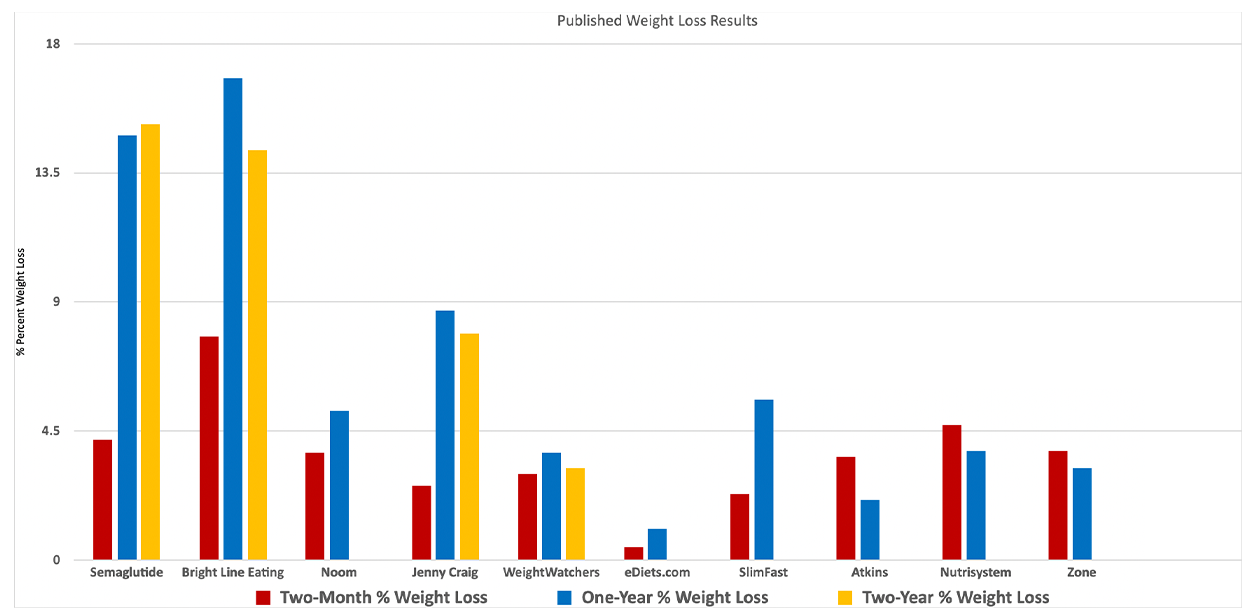Many people have had a long and complicated relationship with their weight. And it doesn’t help that popular culture is constantly trying to sell us a new “ideal” body weight. In April of 1967, Twiggy, a rail-thin supermodel, appeared on the cover of Vogue magazine and quickly rose to stardom. Soon that Twiggy-like body type was seen as the ideal look and dieting culture gripped the Western world, with doctors prescribing diet pills that were little more than methamphetamines. Commercial weight loss programs cashed in on the dieting fervor.
But by the end of the 20th century, the dieting trend was starting to decline. The reality that diets very rarely produce sustained weight loss started to sink in. People gradually shifted their emphasis from shrinking their size to improving their health.
The Health at Every Size and Body Positivity movements were central to this shift. And the Dove brand received widespread praise for its Real Beauty campaign, featuring models with full-figured bodies.
By the 2010s, polls were showing record lows in the percentage of people who wanted to lose weight, and news outlets were reporting that fewer than 1 in 5 people in the US was dieting. All this spelled trouble for the weight loss industry.
Fast forward to the present day, and — shazam! — the semaglutide drugs Ozempic and Wegovy have hit the scene. It turns out that people still want to lose weight after all.
The New Weight Loss Drugs

If companies needed reassurance that weight loss can still be big business, they’ve gotten it. Novo Nordisk, the Danish corporation that makes Ozempic and Wegovy, is now the most valuable company in all of Europe, with a market capitalization of $425 billion dollars, an amount greater than the entire economy of Denmark.
But what are these drugs, and how do they work? Are they really that effective for weight loss? What are the benefits of being on them, and what are the side effects? And, more importantly, are they safe?
There are indeed some surprising benefits — and also eye-opening risks — to semaglutide drugs for weight loss. And in this article, we will cover all of them. We’ll even introduce you to an alternative approach that research shows produces weight loss results equal to Ozempic and Wegovy, without the negative side effects. (Hint: it’s not weight loss surgery, and Big Pharma is not involved).
But first, we need to start at the beginning. Should people even try to lose weight in the first place? And why have conventional approaches to weight loss failed them?
A Rise in Obesity and its Health Effects

Over the last 50–75 years, the average weight of the human population has risen steadily, in lockstep with dramatic changes to our food supply.
According to the World Obesity Atlas, by 2035, fully one-half of all people worldwide, over four billion people, will be living with overweight or obesity. And that’s not good news, for many reasons.
There is still a tremendous stigma associated with excess weight, making overweight and obesity difficult to live with, both socially and psychologically. Obviously, we should continue to strive to reduce that stigma. And people should aim to be healthy, and to love and respect themselves, their bodies, and the people around them, no matter their size.
If negative stigma were the only issue, universal size acceptance and body positivity would be the straightforward answer. However, research continues to confirm that body size is not at all irrelevant to human health.
Furthermore, health-promoting efforts like exercise do not fully offset the risks of carrying excess weight. For example, in a large study of over 50,000 people, researchers found that even robust levels of physical activity don’t neutralize the profoundly damaging toll that obesity takes on cardiovascular health.
Alas, excess weight is simply not benign. It’s linked with mental health conditions like depression and anxiety, conditions of poor well-being like fatigue and chronic pain, potentially life-ending conditions like heart disease and 13 forms of cancer, and, of course (as we were all reminded by the media over and over in 2020 and 2021), severe illness and potential death from diseases like COVID-19.
Bringing our body composition in line with the body fat ratios that our ancient ancestors used to have may well be the healthiest for longevity, not to mention quality of life along the way.
The Truth Behind Weight Gain and Weight Loss
So, what’s driving all this weight gain?
It’s easy to assume that our sedentary lifestyles are to blame. But research shows that active people in hunter-gatherer tribes actually burn no more calories than sedentary people in the Western world.
How can that be?
It turns out that, when we’re very active, the body compensates by burning significantly less fuel the rest of the time, resulting in little to no change to overall daily energy output.
Keep that in mind the next time you think you’ll go to the gym to “burn off” the food you’ve just eaten. You can do that workout, and it will absolutely be healthy for you overall. But when you come home afterward, your body will shift into low gear. (And after a few days, you will have burned no more total calories than if you had just stayed home.) This is part of the reason why exercise won’t make you thin.
Ultra-Processed Foods

More and more experts are starting to converge on the opinion that the true cause of the obesity pandemic is all the ultra-processed food we’re eating. And indeed, solid research shows that ultra-processed foods drive us to eat more and gain weight quite rapidly.
In fact, even when controlling for total presented calories, energy density, and grams of protein, carbohydrate, fat, fiber, sugar, and salt, on a processed foods diet (versus an unprocessed diet of nearly identical composition), participants in the above trial ate significantly more and gained weight in as little as two weeks.
People eating ultra-processed foods don’t just gain weight, though. Their brains and bodies change. Inflammation rises, baseline insulin levels go up, and triglycerides increase. Together these changes are associated with leptin resistance, a condition that means the brain never gets the signal to stop eating.
Plus, ultra-processed foods are addictive, creating the same deficit in dopamine receptors that’s characteristic of cocaine and heroin addiction. And this change in brain chemistry causes powerful food cravings that further drive people to overeat.
This is all bad news for humankind because ultra-processed food consumption is only becoming more and more prevalent.
Today, a full two-thirds of the calories children consume is not what their grandmothers would have called “food” at all, but rather industrial concoctions born in a factory and poured into a plastic wrapper. And the trends aren’t stopping — they’re just going global.
Every 10 hours in 2023, a new McDonald’s opened in China, with a record 900 new franchises added by the end of the year. That’s on top of the roughly 1,200 new KFC and Pizza Hut stores that opened in China as well. The US has spread its “cuisine” around the world — with devastating effects.
How the Brain Can Sabotage Weight Loss Efforts
On a personal level, for the 70% of people in industrialized countries today carrying excess weight, the conundrum is that once weight is gained, it’s incredibly difficult to shed for good. And this is by design.
The brain is happy to allow us to gain weight. After all, fat stores are what will keep us alive when food becomes scarce over a long winter. But the brain fiercely protects our current body weight (even if it’s too high for optimal health) by launching a full-fledged hormonal assault when we lose weight. It very deliberately toggles our hormonal dials: lowering thyroid hormones (reducing our metabolism), increasing ghrelin (triggering hunger pangs), and lowering leptin (so the brain comes to think we’re starving), making sustained weight loss about as easy as holding our breath while climbing a long staircase.
Many people engage in yo-yo dieting and ultimately find themselves demoralized. In a nutshell, diets don’t work. People tend to lose perhaps 2–7% of their starting weight (when they might be aiming to lose several times that much). And then, almost always, they gain it back. Indeed, weight loss programs don’t tend to publish results beyond one year, because after that, weight regain is the norm.
Enter Ozempic and Wegovy
View this post on Instagram
No wonder people are looking for a different solution. And for people who have tried everything else, the new weight loss drugs are offering much-needed hope again. Celebrities of every ilk, from actors, models, and comedians to business magnates and even the former Prime Minister of the UK, are talking about their use of these drugs. But is the hype warranted? Let’s dive in.
What Are the New Weight Loss Drugs and How Do They Work?
Semaglutide drugs were originally designed to help control blood sugar levels in people with type 2 diabetes. They work by mimicking the hormone GLP-1, which has an appetite-suppressing effect.
Tirzepatide drugs, which are also part of the current weight loss trend, mimic both GLP-1 and the hormone GIP, but overall have a similar effect. They increase insulin released from the pancreas and decrease glucagon from the liver, which balances out blood sugar. As a result, people lose weight because they become less interested in eating.
Additionally, these drugs modulate dopamine levels in the addictive centers in the brain, resulting in fewer cravings and decreased anticipation of pleasure from eating. In animal models (FRN’s stance on the use of animals in medical research is here), these drugs were able to reduce cocaine, amphetamine, alcohol, and nicotine use, too. And in fact, reports are flooding in that people on Ozempic and Wegovy are not just eating less, they’re also smoking fewer cigarettes and losing their taste for alcohol.
With the double whammy of less hunger and fewer food cravings, weight loss results can average upwards of 15% of starting body weight. This is many times greater than what people can expect from a conventional weight loss program.
From that perspective, it definitely is the case that semaglutide drugs can work for weight loss. However, from the perspective of a 300-pound person looking to lose perhaps 35–60% of their body weight, the prospect of losing 15% of their starting weight isn’t exactly a home run.
For context, the average person getting Roux-en-Y gastric bypass surgery — the approach that results in the most dramatic weight loss but also comes with a 3.34% mortality rate — can expect to lose a lot of weight initially and then regain a fair bit, settling at a net loss of about 25% of their starting weight after five years. Certainly, weight loss surgeries are far more invasive and involve a host of risks. But are weight loss drugs risky, too?
Is Semaglutide Safe?

The question “Are they safe?” requires us to consider our standards for safety and our tolerance for risk. Is driving a car safe? Flying in an airplane? Jumping out of an airplane with a parachute?
One might argue that carrying a lot of excess weight isn’t “safe,” which means it really comes down to managing risk. So, what are the risks of semaglutide and other weight loss drugs?
Gastrointestinal Symptoms
The main side effects of semaglutide drugs are gastrointestinal in nature, and they can range from very mild to severe. Many people who start on these drugs experience symptoms like nausea, vomiting, diarrhea, constipation, sharp pain, belching, gas, bloating, or intestinal blockage.
For some people, the side effects are problematic enough that they stop taking the drug. In fact, many prominent celebrities have done so because it made them feel too sick. But most people find that the side effects subside with continued use. Starting on a low dose and then gradually increasing it can reduce the likelihood that GI symptoms will be debilitating.
Unfortunately, we don’t have any clear long-term data on what these drugs do to the gastrointestinal system over time.
Thyroid Cancer Risk

People taking semaglutide drugs may also have an increased risk of developing thyroid cancer, so people with a family history of the disease are cautioned not to take them. As a result, the FDA has put a black box warning (its highest level of warning) on the Ozempic and Wegovy packaging for thyroid cancer.
That said, a meta-analysis of 45 randomized controlled trials showed an increase in thyroid disorders, but not thyroid cancer. Because these instances are rare occurrences, more research is needed.
Muscle Reduction
Finally, many outlets have reported that semaglutide drugs reduce lean muscle mass (rather than just fat mass). But there are also several studies that contradict that claim — so the jury is still out on this point.
How Much Does Ozempic or Wegovy Cost?

One of the biggest downsides to semaglutide drugs for weight loss is the financial cost. Getting a weekly injection (and yes, most of these drugs are administered by injection) of Wegovy can cost over $1,300 per month in the US — that’s around $16,000 per year. The drugs are priced significantly lower in other countries (although still expensive). But these sky-high prices are resulting in insurance companies dropping these medications from their plans, so getting coverage can be difficult.
There are innumerable plans, and policies change frequently, so a Google search is not likely to help you determine whether insurance will cover Ozempic or Wegovy. If you have health insurance, the best way to find out is to contact your insurance provider directly. There are some coupons and programs that help people pay for the drugs. But the bottom line is that the financial investment is likely significant.
And the cost doesn’t just impact the user. Any time insurance providers, even including governments, pay for an expensive treatment, the cost is ultimately absorbed by everyone in their covered pool — through higher premiums and/or taxes. This means that if costly weight loss drugs come to be used widely, the price of medical insurance could go up for just about everyone.
Weight Regain
If you’re not prepared to be on the drugs for the rest of your life, then it’s also important to know that, once the drugs are discontinued, most of the weight tends to come back rather quickly.
One large study found that participants regained two-thirds of the total weight they’d lost within the first year of stopping the medication. This is perhaps not surprising. When you stop taking cholesterol medication, you expect your cholesterol to go up again. The same logic applies to semaglutide drugs.
It would be nice if the brain would adapt to your new, lower weight and allow you to maintain it as a “new normal.” But it doesn’t. This means that someone taking the drugs for weight loss will either need to prepare to be on them for life or adopt new lifestyle interventions that will allow them to manage their weight when they wean off.
The trouble is that, when appetite and cravings are artificially suppressed, motivation is not strong to adopt rigorous new eating habits. If the person could have done that in the first place, they would have lost weight without the drug.
Are There Long-Term Studies on the New Weight Loss Drugs?

Unfortunately, no. We don’t have a lot of long-term data on Ozempic or Wegovy. But the first GLP-1 agonist to be approved for type 2 diabetes was Byetta (Exenatide) in 2005. You can think of it as a first cousin to Ozempic and Wegovy.
That drug does have a study on long-term outcomes. Results showed that Exenatide continued to provide blood sugar stabilization to type 2 diabetics with no unexpected adverse events for seven years.
Semaglutide drugs also seem to protect people from death and adverse events from heart disease, so much so that the FDA has approved Ozempic as a treatment for heart disease.
In a double-blind, randomized clinical trial with 17,604 patients, weekly semaglutide injections were found to reduce cardiovascular events like strokes and heart attacks by 20%.
Are There Alternatives to Ozempic and Wegovy?
Since the Ozempic and Wegovy craze has hit the world, reports have been coming out that eating more fiber (the kind naturally found in whole, plant-based foods) can have a semaglutide-like effect.
Interestingly enough, just the act of chewing increases GLP-1 release. It also decreases the release of ghrelin, the hunger hormone. That’s super interesting because ultra-processed foods are designed to minimize chewing, and experts have highlighted the stark difference in chewing intensity and frequency between eating the standard American diet versus a diet of whole, real foods.
In short, it’s reasonable to conclude that, if you’re eating the right foods, the results that people are getting with Ozempic and Wegovy should be achievable through diet alone.
And, there is a line of research that shows exactly that. Over the past nine years, a habit-based program focused on eliminating ultra-processed foods and eating only whole, real foods, Bright Line Eating, has published weight loss results comparable to semaglutide drugs.
Full disclosure: I developed this program, which grew out of my decades of research in the field, and I’m the CEO and owner of an organization that champions bringing this body of work into the world. The following graph shows the weight loss results, published in peer-reviewed scientific journals, of many of the most common commercial weight loss programs, compared with Bright Line Eating and semaglutide drugs.

References:
-
[1]
-
[2]
-
[3]
-
[4]
-
[5]
-
[6]
-
[7]
-
[8]
-
[9]
-
[10]
-
[11]
-
[12]
-
[13]
-
[14]
-
[15]
-
[16]
Bright Line Eating is the only commercial weight loss program that addresses the addictive nature of ultra-processed foods. Indeed, it’s tailored mainly for people who score between 7 and 10 on a Food Addiction Susceptibility Scale that goes from 1–10. By taking this short quiz, you can see how you score.
Research also shows that losing weight within a community like Bright Line Eating is associated with positive “side effects” such as higher energy, greater feelings of connection, better quality of life, decreased depression, and fewer days of poor mental health — and that with this way of eating, hunger and food cravings go steadily down.
The Future of the Weight Loss Industry

Without a doubt, the genie is out of the bottle. Weight loss drugs are here to stay. And the development of further drugs in this category is progressing rapidly.
Currently, the drugs approved for weight loss require regular injections because the peptides in semaglutide don’t absorb well through the digestive system. But Novo Nordisk has innovated a pill form of semaglutide called Rybelsus that the FDA has already approved for the treatment of diabetes.
In November of 2023, the FDA also approved Zepbound, a new tirzepatide drug developed by Eli Lilly, for weight loss. Given the multibillion-dollar market that’s available here, there’s no doubt that the rapid development of new options will continue. And as generics come out (Novo Nordisk’s patent on Ozempic expires December 5, 2031), the cost will eventually come down at least somewhat from the current stratospheric levels.
About 45% of people polled in the US say they would consider taking a weight loss drug. That comes down to 16% if it’s not covered by insurance. But these are people who have come to believe that sustained weight loss is largely impossible without a pharmacological or surgical solution.
But the results of Bright Line Eating highlight the reality that lifestyle-based approaches are worth pursuing, and that ultra-processed food addiction needs to be addressed for people to be successful.
Losing weight when you’re hungry and plagued by food cravings is unsustainable. We now live in a world where there are drugs that can take away excessive hunger and addictive food cravings. But emerging evidence shows that we can eat to reduce hunger and cravings as well. Not to be Twiggy, but to be healthy.
Tell us in the comments:
- Are you trying to lose weight or have you tried to in the past?
- What do you find most challenging about weight loss?
- Do you plan on trying a semaglutide drug like Wegovy or a more natural alternative?
Featured Image: iStock.com/CR




